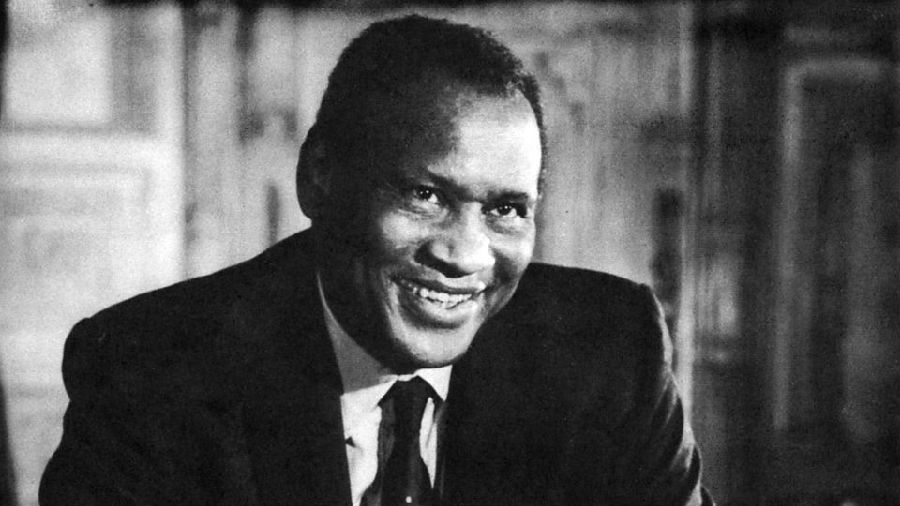I'm Shirley Griffith. And I'm Steve Ember with the VOA Special English program PEOPLE IN AMERICA. Today, we tell about Paul Robeson. He was a singer, actor, and civil rights activist. In the nineteen thirties, he was one of the best known and most widely honored black Americans. Later in his life he was condemned for supporting communism and the Soviet Union.
Paul Robeson was born in Princeton, New Jersey in eighteen ninety-eight. His father was a former slave who became the religious leader of a Protestant church. Paul was an excellent student and athlete. Rutgers University in New Jersey gave him money so he could study there. He played four different sports while at Rutgers. He also was the top student in his class. Members of his class believed Paul Robeson would become the leader of black people in America.
Paul Robeson graduated from Rutgers in nineteen nineteen. He attended law school at Columbia University in New York City. He was only the third black person to attend Columbia Law School. On the weekends, he earned money by playing professional football. He also acted in plays. He married Eslanda Cordoza Goode while he was in law school. After he graduated in nineteen twenty-three, he got a job with a group of lawyers in New York. However, he left when he experienced unfair treatment because he was black. He decided not to work as a lawyer. Instead, he wanted to use his ability in theater and music to support African American history and culture.
Robeson became a professional actor. He joined the Provincetown Players, an acting group linked to American playwright Eugene O'Neill. Robeson was the star in two famous productions by Eugene O'Neill in the nineteen twenties. They were "All God's Chillun Got Wings" and "The Emperor Jones." Critics praised his performances. Robeson became the most recognized black actor of his time.
In London, he earned international praise for his leading part in William Shakespeare's great tragic play, "Othello." That was in Nineteen thirty. Thirteen years later, he played "Othello" on Broadway in New York. It was very popular. In "Othello," Robeson played an African general in ancient Venice. He is married to a young white woman. Othello kills his wife after being tricked into believing that she loves someone else. This is how Paul Robeson sounded in "Othello." Paul Robeson also was famous for appearing in the popular American musical play "Show Boat." He performed the play in London in nineteen twenty-eight and on Broadway four years later. He played a riverboat worker. Jerome Kern wrote the music for "Show Boat." Paul Robeson sang the song "Ol' Man River."
Paul Robeson appeared in eleven movies in the nineteen twenties and nineteen thirties. However, he realized that his acting was limited by the small number of parts for black actors. He criticized the American movie industry for not showing the real lives of black people in America. He stopped making movies and decided to sing professionally instead.
Robeson sang many kinds of music. He sang folk music from many countries. He sang songs to support the labor and social movements of his time. He sang songs for peace and justice. And, he sang African American spiritual music. One of his famous songs was this spiritual, "Balm in Gilead."

Paul Robeson was recognized around the world for his fight for civil rights for black Americans. Separation of black people and white people was legal in the United States. Black people did not have the same rights as white people. They were not treated equally. For example, Robeson could not be served in some eating places in the United States. Violence against black people was common. Angry mobs of whites sometimes killed black people, especially in the southern United States.
In the late nineteen thirties, Paul Robeson became involved in national and international movements that sought peace and better labor conditions. He also supported independence for African colonies from their European rulers. He learned the languages and folk songs of other cultures. He said these folk songs expressed the same feelings that were in African American music. He learned to speak, write and sing in more than twenty languages. Robeson traveled a great deal in Europe during the nineteen thirties. He found that black people were treated better in Europe than in the United States. He met members of liberal political organizations, socialists and African nationalists. He also met many working people and poor people.
For many years, he performed in concerts in many countries. The songs he sang supported the struggle for racial justice for black Americans, and for civil rights and economic justice for people around the world. He refused to perform at concerts where the people were separated by race. He said: "The idea of my concerts is to suggest that all men are brothers because of their music."
In nineteen thirty-four, Paul Robeson made the first of many trips to the Soviet Union. In the Soviet Union, he said, he was treated as an equal of whites for the first time in his life. He declared his friendship for the Soviet Union. And he spoke about the need for peaceful co-existence between the United States and the Soviet Union. Conservative groups in the United States strongly opposed his friendship with the Soviet Union and his support for other liberal issues.
Paul Robeson went to Spain in nineteen thirty-eight during the Spanish Civil War. He sang for Spanish civilians. And he sang for the Loyalist forces fighting for the Spanish republic. One of the songs he sang was this Spanish Loyalist song, "The Four Insurgent Generals." In the nineteen forties, many people in the United States were strongly opposed to Paul Robeson's political beliefs. They said he was too liberal or extreme. Next week, we will tell you about how opposition to his political beliefs affected the last part of his life.












